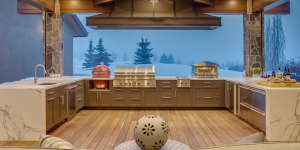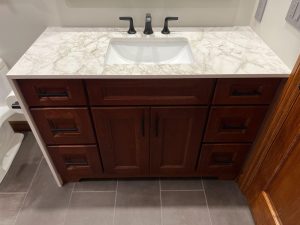Many homeowners still think of countertops in terms of granite, quartz, or marble. But designers know the industry has moved forward. Some homeowners in the Midwest are also starting to jump on the new era of beauty and functionality with Dekton surfaces.
Dekton, an ultra-compact surface developed by Cosentino, is not just another countertop material. It redefines durability and design possibilities for the modern kitchen, bathroom, and even outdoor spaces. In this article, we’ll break down what Dekton is, how it’s made, and why interior designers are increasingly choosing it.
What is Dekton? A Revolutionary Ultra-Compact Surface
Dekton is not a natural stone like granite or marble, but a sintered stone created through a revolutionary manufacturing process.
Raw materials found in glass, quartz, and porcelain are fused together under extreme heat and pressure, forming a dense, ultra-compact surface without tensions or weak points. The result is a non-porous material that resists stains, heat, and UV rays, making it suitable for both indoor and outdoor applications.
Designers also appreciate the creative freedom Dekton offers. Available in a wide range of colors and finishes, from polished to matte to textured raw looks, Dekton countertops open up design possibilities that natural materials can’t always match.
This balance of beauty and performance is precisely why interior designers and architects are turning to Dekton, a point we’ll explore in the next section on durability and aesthetics.
Why Are Designers and Homeowners Choosing Dekton?
Dekton answers the key question every homeowner asks: “Will it look good and last?” With Dekton, the answer is a confident yes.
1. Durability that Exceeds Expectations
One of the biggest advantages of Dekton countertops is their unmatched durability. Unlike natural stone, which can chip or crack along natural fissures, Dekton is engineered under extreme heat and pressure to eliminate weak points. That means it resists scratches better than quartz and holds up against heat in ways granite can’t always match.
As a homeowner, this durability means you have the luxury of mistakenly setting hot pans directly on the surface, cutting vegetables without worrying about scratching, and leaving your outdoor kitchen exposed to Midwest UV rays or freezing temperatures without fading or cracking. Simply put, Dekton is built for decades, not just years.
2. Aesthetics Without Limitations
Design isn’t just about performance; it’s also about how a material elevates a space. Dekton surfaces are available in a wide range of colors and finishes—from sleek matte textures that mimic concrete to polished surfaces that rival marble’s elegance. For designers, this flexibility is critical.
It allows them to specify a single material that can smoothly tie together a kitchen countertop, backsplash, and even a floor without breaking visual continuity. For homeowners, it means you don’t have to compromise between style and practicality.
For more inspiration on blending natural materials with engineered surfaces, don’t miss our feature on On-Trend Pairing Natural Stone and Quartz.
3. Versatility Across Indoor and Outdoor Spaces
Dekton isn’t limited to kitchen countertops. Its ultra-compact nature allows it to be used in bathrooms, fireplace surrounds, floors, wall cladding, and outdoor applications. Imagine using one material for your indoor kitchen island, outdoor kitchen, and living room fireplace wall—creating a cohesive flow throughout your home.
This versatility is why interior designers and architects rely on Dekton when planning spaces that need both performance and visual harmony. Few materials can handle high-traffic indoor areas and harsh outdoor conditions with the same confidence.
4. Low Maintenance for Modern Living
One of the common frustrations with natural stone is sealing. Granite, marble, and quartzite require regular sealing to protect against stains and etching. Dekton, on the other hand, is a non-porous material, meaning liquids won’t seep in and leave marks. Cleaning is as simple as using mild soap and water.
For homeowners, that translates to less time worrying about maintenance and more time enjoying the space. And for designers, recommending a low-maintenance material builds trust—it’s a solution that keeps clients happy long after installation.
Where Can You Use Dekton in Your Home?
Dekton isn’t just limited to kitchen countertops. Because of its durability and non-porous nature, designers are using it in places where traditional materials often fail.
- Kitchen Countertops and Islands. Dekton countertops are highly resistant to scratches, stains, and heat—qualities every kitchen demands. Unlike quartz, it won’t discolor under UV light streaming through large windows, making it ideal for open-concept kitchens filled with natural light.
- Bathroom Vanities and Walls. In wet spaces where natural stone can stain or etch, Dekton’s non-porous surface offers peace of mind. Its range of colors and finishes lets homeowners create sleek bathroom designs without worrying about moisture absorption or regular sealing.
If bathrooms are your focus, you’ll want to see our article on Top Reasons to Install Granite Bathroom Countertops - Outdoor Kitchens. Midwest climates challenge most materials, but Dekton stands up to UV rays, freeze-thaw cycles, and temperature fluctuations. That makes it a top choice for outdoor cooking areas where both durability and aesthetics matter.
- Floors and High-Traffic Areas. As a sintered stone, Dekton is engineered to handle pressure and impact. Its ability to resist wear makes it a practical surface for floors, especially in high-traffic living spaces where beauty and functionality must coexist.
- Fireplace Surrounds and Wall Cladding. Heat resistance and numerous design possibilities mean Dekton isn’t limited to horizontal surfaces. Designers often use it vertically for fireplace surrounds or wall cladding, creating continuity throughout a room.
Wherever it’s used, Dekton offers homeowners and designers the chance to unify style and performance—something that few countertop materials achieve across so many applications.
Conclusion
Dekton stands apart because it blends durability, aesthetics, and versatility in a way few surfaces can match. From kitchen design to outdoor applications, it offers homeowners and designers a material that delivers beauty without compromise.
If you’re looking for the best countertop material for your next project, Dekton’s versatility makes it an ideal choice. Visit our showroom to explore Dekton slabs in person, find the best countertop for your space, and see the range of colors and finishes Dekton offers.
And if you’re planning a remodel beyond countertops, explore our roundup of Ideas for Remodeling a Kitchen or Bathroom to spark design possibilities before visiting our showroom.
FAQs About Dekton Countertops
1. What makes Dekton different from quartz or granite countertops?
Dekton countertops are sintered stone, created under extreme heat and pressure to eliminate weak points. Unlike quartz countertops or granite, Dekton is non-porous, highly resistant to stains, and available in a broader range of colors and finishes for both indoor and outdoor applications.
2. Is Dekton a good choice for outdoor kitchens?
Yes. Dekton is one of the best countertop materials for outdoor kitchens because it resists UV rays, heat, and freezing temperatures without fading or cracking. Its durability and minimal maintenance requirements make it a reliable choice for outdoor settings in all climates.
3. How durable are Dekton countertops in high-traffic areas?
Dekton countertops excel in high-traffic areas thanks to their resistance to scratches, stains, and heat. Unlike natural stone, they don’t weaken along veins or fissures. This durability makes them suitable for busy kitchens, commercial interiors, and outdoor spaces that see heavy daily use.
4. What finishes and colors is Dekton available in?
Dekton is offered in a wide range of colors and finishes, including matte, polished, and textured looks. Designers often choose it for the flexibility to match different aesthetics, from marble-inspired surfaces to sleek, modern tones, without compromising on performance.
5. Does Dekton require sealing or special maintenance?
No. Dekton is a non-porous material, which means it does not require sealing like granite or marble. It’s resistant to stains and cleans easily with soap and water, making it a low-maintenance option for both indoor and outdoor applications.


